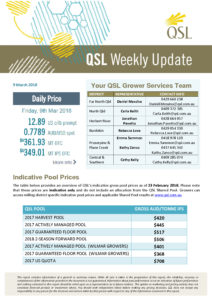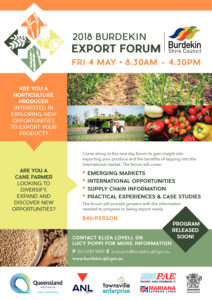Year: 2018
Kalagro Daily Fuel Price
Price effective Thursday, 15th March 2018
DIESEL – $1.22812 including GST
UNLEADED – $1.25094 including GST
To place orders, please contact the Kalamia Cane Growers office.
Wednesday, 14 March 2018
The May 2018 contract settled at:
12.62 US c/b
The Australian Dollar currently trades at:
78.60 US cents.
Forward indicative prices in Australian dollars are:
$351 for MAY Contract – 2017 season
$380 for 2018 season
$415 for 2019 season
$430 for 2020 season
Proudly brought to you by Kalagro.
Kalagro Daily Fuel Price
Price effective Wednesday, 14th March 2018
DIESEL – $1.22782 including GST
UNLEADED – $1.25354 including GST
To place orders, please contact the Kalamia Cane Growers office.
Tuesday, 13 March 2018
The May 2018 contract settled at:
12.93 US c/b
The Australian Dollar currently trades at:
78.73 US cents.
Forward indicative prices in Australian dollars are:
$357 for MAY Contract – 2017 season
$385 for 2018 season
$417 for 2019 season
$429 for 2020 season
Proudly brought to you by Kalagro.
Monday, 12 March 2018
The May 2018 contract settled at:
12.84 US c/b
The Australian Dollar currently trades at:
78.53 US cents.
Forward indicative prices in Australian dollars are:
$357 for MAY Contract – 2017 season
$383 for 2018 season
$414 for 2019 season
$428 for 2020 season
Proudly brought to you by Kalagro.
Kalagro Daily Fuel Price
Price effective Tuesday, 13th March 2018
DIESEL – $1.22694 including GST
UNLEADED – $1.25533 including GST
To place orders, please contact the Kalamia Cane Growers office.
Wet Tropics sugarcane media release: Hidden sugarcane disease stealing industry profits
Hidden sugarcane disease stealing industry profits
The Far North Queensland sugarcane industry is joining together to combat the bacterial disease, ratoon stunting disease (RSD).
The disease has been known to growers, millers, and researchers for more than 70 years, but it continues to cost the industry through lost production and requires ongoing vigilance and management.
Sugar Research Australia Adoption Officer, Mr Gavin Rodman, based at Meringa station near Gordonvale said: “RSD is something that can be managed by using disease-free planting material, keeping blocks free of volunteer cane from the previous crop and by maintaining good machinery hygiene practices.
“Unfortunately, some of these practices are no longer being followed religiously, which has led to a dramatic increase in infected cane throughout a large part of the Wet Tropics. Some mill areas within the Wet Tropics are reporting positive infections in 30 percent of blocks tested.
“The cane that is being tested for use as planting material is meant to be the best cane we have. It is scary to think about what sort of numbers we are talking about when it comes to infection within commercial blocks.
“Specialised methodology and lab analysis is required to diagnose the disease. The days of slicing open a stalk and looking for the disease in the field or under a microscope are gone. We know that these methods unacceptably underestimate infection.
“If RSD is present, there is a good chance you are losing significant yield.”
Cane productivity services organisations from Tully, Innisfail, Babinda, Mulgrave, Mossman and Canegrowers Tableland, MSF Sugar and SRA have teamed up to tackle the issue.
MSF Sugar Mulgrave Field Officer, Mr Matt Hession, said RSD was one of the easiest diseases to spread but also one of the hardest to manage.
“Mulgrave growers have been very conscientious about RSD in the past and this is evident in our low infection rate,” Mr Hession said.
“However, as milling companies and contractors begin to operate across productivity boundaries attention again needs to focus on farm hygiene.
SRA Media Release
SRA appoints Mr Ian McBean as Executive Manager, Regional Delivery
Sugar Research Australia (SRA) has appointed experienced sugar industry professional, Mr Ian McBean, as its Executive Manager, Regional Delivery.
Mr McBean has had an extensive career in the sugar industry in Australia and internationally and was most recently employed at Sunshine Sugar in NSW, where he was part of the Executive Team and held the role of General Manager.
SRA has worked with the Australian sugarcane industry to develop a new strategy for industry-led adoption activities. As part of this process, the industry identified the need for SRA to appoint an Executive Manager, Regional Delivery, and Mr McBean will be the driving force behind the strategy in this newly-created role.
“Ian has extensive experience working with growers in Queensland and NSW, he has an in-depth understanding of the needs of the milling sector, and he has been instrumental in delivering extension and adoption outcomes throughout his career. This has been an area of focus in recent years in NSW,” SRA CEO, Mr Neil Fisher, said.
“He understands that the Australian sugarcane industry must be productive, profitable, and sustainable, and that a key component of this is ensuring that the research developed by SRA is adopted on-farm by growers.
“A large part of our industry operates adjacent to the Great Barrier Reef, and our industry is acutely aware that we must continue to make positive steps forward through research and adoption of best practices. The industry adoption strategy is a critical component of ensuring this future productivity, profitability, and sustainability.”
In this role, Mr McBean will serve as the key conduit for regional coordinators and other stakeholders to engage with SRA. He will also serve as executive officer for the industry adoption advisory group, oversee the development of regional annual operational plans, manage relevant SRA staff, and facilitate cross-regional linkages.
The strategy for adoption in the sugar industry is underpinned by four key elements of well-functioning extension and adoption systems:

